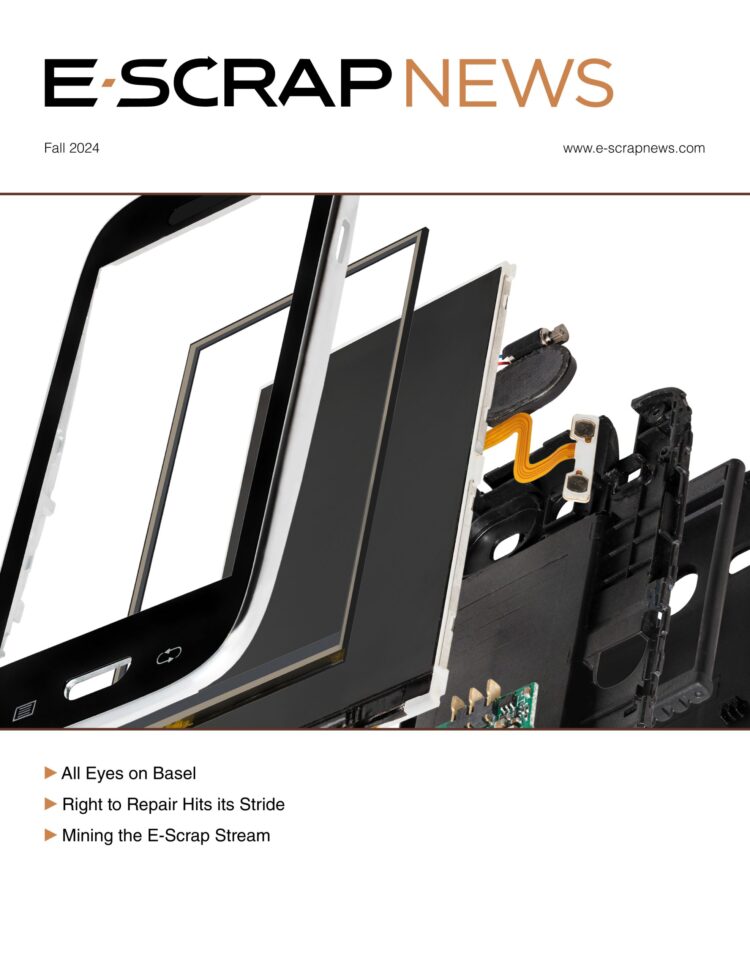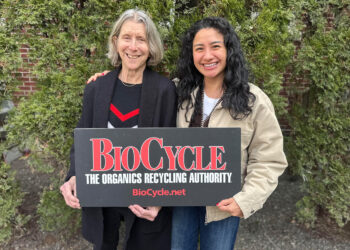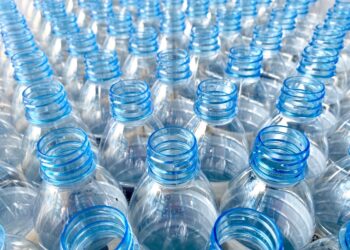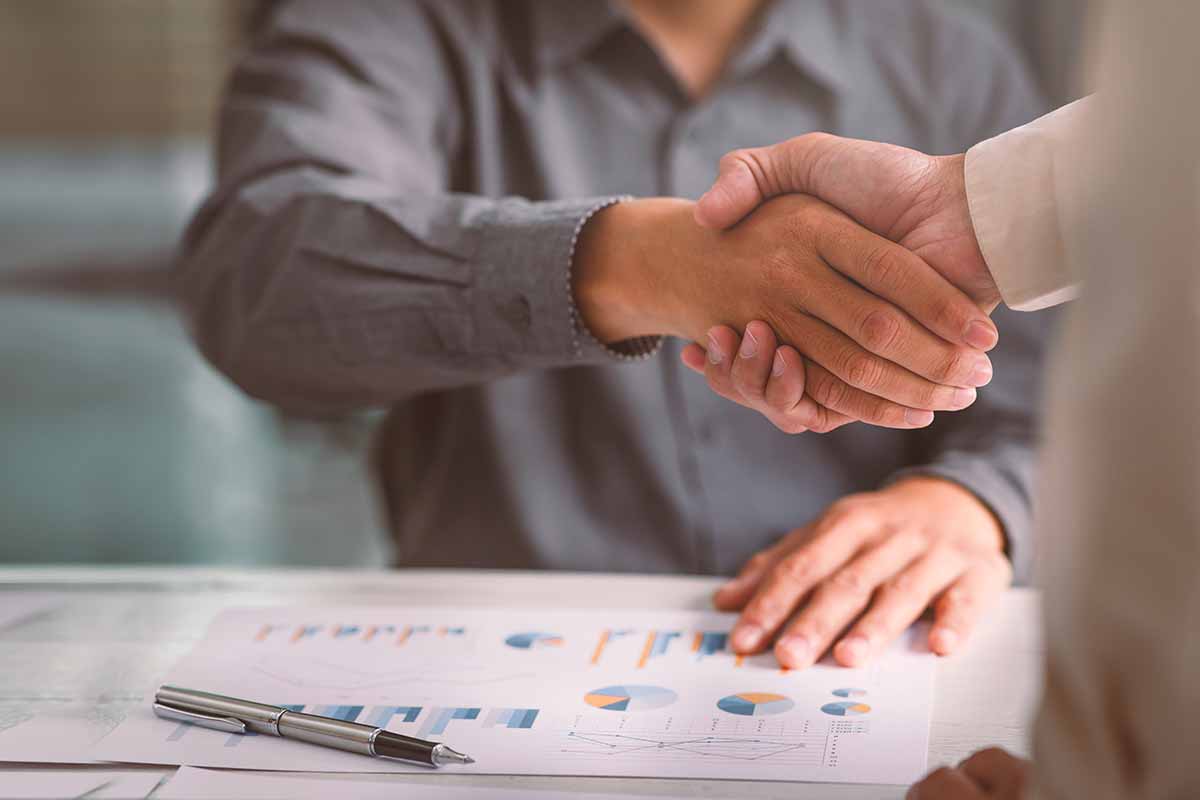This article appeared in the 2024 issue of E-Scrap News. Subscribe today for access to all print content.
Upcoming changes to the Basel Convention are likely to disrupt some industry practices when they take effect next year. They’ve already had one remarkable impact: bringing together two often rival certification organizations to advocate for industry-wide compliance with the new rules.
Just a few years ago, the idea of any joint collaboration between the Basel Action Network and Sustainable Electronics Recycling International was virtually unheard of. The two organizations respectively administer the major e-scrap certifications, e-Stewards and R2, and although many companies are certified to both standards, they have historically had an acrimonious relationship.
The certifications have developed “opposing camps” and engaged in “more than a little mud-slinging,” one e-scrap operator and former e-Stewards employee noted in a 2021 E-Scrap News op-ed. As a couple examples, BAN has criticized SERI’s historically less stringent attitude on material exports; SERI has criticized BAN’s tactics and presentation of findings; and the certifications are sometimes pitted against each other competitively by state programs picking one certification to which participating processors must adhere.
So it was perhaps an understatement when Selena Turnock, certification director for e-Stewards, noted in a July 16 webinar that the attendees were “witnessing a little bit of history,” as the event marked the first event presented jointly by BAN and SERI.
Broadly speaking, the upcoming Basel changes, which have been detailed at length in E-Scrap News and will be the subject of a plenary session at the upcoming 2024 E-Scrap Conference, categorize a wider array of electronics as regulated materials under the convention. They come on top of 2021 changes that classified mixed plastic, including e-plastics from electronics, as regulated materials.
In general, Basel-regulated material requires more notification and paperwork before it can be exported, but it’s a different story for companies operating in the U.S., which is one of the few countries that is not party to the convention. Under the Basel rules, regulated material is not allowed to be shipped from non-party countries to party nations, with some limited exceptions.
That means under a strict reading of Basel rules, come Jan. 1, U.S. e-scrap companies will no longer be able to export their output to virtually any overseas buyers. It’s a huge change, and one that ITAD companies aware of the regulations are figuring out how to handle.
“It really has become the de facto agreement for the circular economy,” said Paul Hagen, an attorney with Beveridge & Diamond and a longtime Basel expert, speaking during a panel at the ISRI2024 conference in Las Vegas in April.
The collaboration between BAN and SERI emerged about a year ago. During the webinar, Jim Puckett, executive director of BAN, said that his group learned at that time that a lot of U.S. recycling companies were exporting scrap plastic overseas despite the 2021 Basel Convention amendment that brought such scrap plastic into Basel regulation. BAN found the exports of scrap plastic — including e-plastics from electronics recycling facilities — were going primarily to Malaysia, which doesn’t have an agreement allowing imports from the U.S. to occur outside of Basel regulations.
“This was very concerning,” Puckett said. “We knew we couldn’t just go this alone and alert the whole industry by ourselves.”
So BAN reached out to SERI, he said, and began a coordinated response as the two major certifying organizations in the e-scrap space. Their first public collaboration was an op-ed in E-Scrap News, urging the industry to adhere to Basel regulations despite the challenge.
“That was the beginning of a joint effort to educate the industry, and alert the industry hopefully in a more timely manner as to developments at Basel as they affect our industry,” Puckett said.
The webinar, which can be viewed on e-Stewards’ website, marked a way for the groups to lay out regulations to certified companies, so they know how the regulations apply to the materials they handle, and so they can remain in compliance with the standards, said Mike Easterbrook, chief of global standards for SERI.
From SERI’s perspective, adherence to the recent and upcoming Basel guidelines is paramount for R2-certified recycling companies and is indeed a requirement for maintaining that certification, Easterbrook explained. He said a requirement of being certified is demonstrating that the company has a process in place to show compliance with applicable laws, such as Basel, and that the compliance audits are conducted by the certifying organization, either R2 or e-Stewards.
“Many customers that require R2 or e-Stewards certification would expect legal compliance from that facility, as a bare minimum,” Easterbrook said. “Compliance is non-optional for certified companies.”
A global watchdog
BAN has assumed an active role in holding the e-scrap sector to the convention’s more stringent regulations. In July it rolled out a confidential reporting website, the BAN Whistleblower Portal, seeking to make it easier for observers to report poor e-scrap management practices, such as questionable exports of devices and e-plastics, data security lapses and problematic storage or disposal.
The announcement followed Malaysian customs officials’ report in June that more than 100 recently imported shipping containers contained e-scrap they said was illegally imported from the U.S. BAN had flagged the containers as likely containing end-of-life electronics, and it had called on the customs agency to inspect them.
In a statement, BAN Chief Operating Officer Hayley Palmer said the group has seen “a new wave of unscrupulous recyclers, waste managers and brokers that seek to use the developing world as their convenient dumping grounds in order to maximize profits at the expense of people and the planet.”
“Equally distressing is finding out how many respectable companies are willing to ignore their corporate responsibility and make use of such unethical service providers,” Palmer added.
The whistleblower portal allows employees at recycling firms or anyone else with knowledge of company practices to confidentially submit information.
“If you are witness to practices in your business or institution that are illegal or improper in the arena of waste management, including non-compliance with the law or with recycling certifications, we urge you to serve your conscience, human health and the environment by speaking out,” BAN states on the portal page.
The portal allows users to request various levels of confidentiality and to submit documents backing up their observations.
After BAN’s warning, the Malaysian government inspected more than 300 shipping containers and found that about one-third contained contraband e-scrap, officials said during a June 26 press conference in that country. Environment Minister Nik Nazmi Nik Ahmad said 200 more containers remained to be inspected at the time.
BAN in August also alerted Thai and South African regulators to the possibility of illegal shipments containing toxic electric arc steel furnace dust collected from pollution control filters in Albania.
BAN, which administers the e-Stewards certification standard, has been raising awareness about international shipments of e-scrap and e-plastics for some time. The organization has even revoked e-Stewards certification for companies that are found to export e-scrap materials.
In January 2025, e-scrap shipments from the U.S. to most foreign countries could drop dramatically upon implementation of an amendment to the Basel Convention.
BAN Executive Director Jim Puckett said in a press release the group would work to see that the U.S. government takes the containers back and the exporters are held accountable. Although U.S. exporters are not bound by Basel regulations, in the U.S. the Department of Justice has previously brought federal charges, including fraud, against exporters depending on the circumstances. If an e-scrap company misrepresents to customers how collected material will be handled, that could constitute fraud, for example.
“The task of prosecuting the U.S. exporters is an important one, but difficult due to the fact that the U.S. is one of the very few countries in the world that has not ratified the Basel Convention,” the press release noted. “Nevertheless, BAN has been able to seek justice by working with the U.S. Department of Justice to charge U.S. recyclers that were trafficking e-wastes with fraud and other crimes.”
Mageswari Sangaralingam, secretary of Sahabat Alam Malaysia, said in BAN’s press release that “Malaysia is increasingly becoming a dumping ground for plastic and electronic wastes from rich countries like the U.S.”
“We applaud our enforcement agencies for working with NGOs nationally and internationally to end waste trafficking, and urge them to be vigilant against possible corruption,” Sangaralingam added. “The containers must not only be sent back but all companies and individuals trafficking or enabling illegal e-waste and plastic waste must be held accountable.”
Antoinette Smith contributed to this report.

























